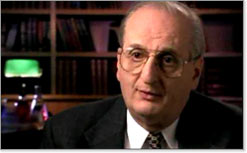A Tribute to Judah Folkman
by Nancy Linde
In memory of a good and gentle man
On January 14, 2008, Dr. Judah
Folkman was doing something he did scores of times every year—traveling
to a scientific conference in British Columbia to inspire young researchers and
reinvigorate established ones by talking about angiogenesis, the scientific field
he gave birth to in the 1960s and nurtured for more than 40 years. But Dr.
Folkman never made it to that conference. En route to Vancouver, he collapsed
and died at the age of 74.
If Dr. Folkman could have his way,
he would want me to write about angiogenesis (the growth of new blood vessels)
and the role it plays in disease. He would want me to explain how stopping the
growth of those blood vessels (anti-angiogenesis) can halt many diseases. He
would want me to note that more than a million patients around the world are
now taking anti-angiogenic drugs to treat cancer and to stop, even reverse, the
blinding effects of macular degeneration.
Dr. Folkman is called the father of
angiogenesis because, like any good father, he believed in his science,
supported it, promoted it, and defended it. He stayed with angiogenesis during
the dark years when few people believed in it. He remained steadfast during the
manic years when expectations ran unrealistically high. For more than four
decades, Dr. Folkman was a man on a mission. It was a scientific mission, to be
sure, but at its core, Dr. Folkman was on a mission to stop human suffering.
And that's why I don't
want to write about angiogenesis but to focus on the man I came to know through
the production of the NOVA film Cancer Warrior. William Wordsworth once wrote
"the best portion of a good man's life is his little nameless,
unremembered acts of kindness." But, in fact, those acts of kindness are
the things I remember best about Dr. Folkman.
I remember how, even though he
ceased treating patients decades ago to concentrate on his research, he would
stop everything when he was asked to consult on a particularly challenging
case. I remember how this good and gentle man would end every day, after 10,
12, or even more hours of exhausting work, by returning at least a half-dozen
calls to cancer sufferers in search of a glimmer of hope. I remember how humbly
he spoke about his own achievements and how gloriously he spoke about the
achievements of his colleagues. And most of all, I remember how dearly loved he
was by the people he worked with, from the office staff and lab assistants to
world-renowned researchers.
It is those colleagues, and his
wonderful family whose sadness is immeasurable, that I think about. But Dr. Folkman's
death is also an immense loss for science. A bright and shining light has been
extinguished. An optimistic scientist who believed that hard problems can be
solved. A dedicated scientist who understood that failure was a necessary and
important part of the process. A passionate scientist who inspired many
thousands of others. It falls to those who knew him to carry on his work. But
along the way, I hope they also remember those "little, nameless …
acts of kindness" that made Dr. Folkman so special.
For "Cancer Warrior,"
we filmed a very long interview with Dr. Folkman over a period of several
days. Towards the end, he was telling us the story of what was perhaps his most
important insight, which came to him not in a laboratory but while he was sitting
in temple during the Jewish high holiday of Yom Kippur. When the filming ended,
Dr. Folkman regaled us with a few (somewhat lame) jokes. But I kept thinking
about the story he had told and finally asked, "Dr. Folkman, it was Yom
Kippur and you weren't praying or seeking atonement. You were instead
thinking about your work. What would God say about that?" He smiled and
didn't skip a beat: "God would not have a problem. Maybe he took
that opportunity to put the idea in my head."
Rest in peace, Dr. Folkman, and
thank you for giving your best and expecting the best from everyone who was
privileged to have crossed paths with you.



